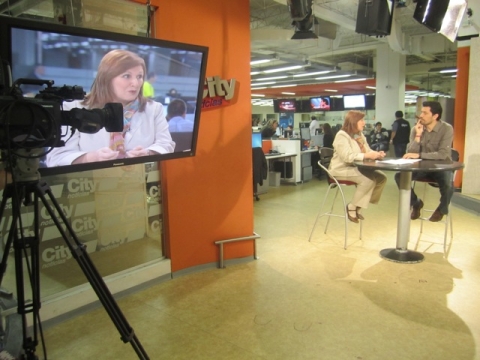
Interview about the launch of "Pilas Bogota" with Ernesto Cortes of El Tiempo on the set of City TV. Photo by Natalia Gomez.

Workshop in Monteria, Colombia on Corruption Map, late August 2012

Participants at workshop in Manizales, Colombia on crowdsourcing and the Monitor de Corrupción

During a Hacks-Hackers Bogota meeting

Interview about the launch of "Pilas Bogota" with Ernesto Cortes of El Tiempo on the set of City TV. Photo by Natalia Gomez.
There have been changes in Colombia since I arrived here 14 months ago. Peace talks between the oldest guerrilla group and the government are beginning. A free trade agreement with the United States is in place, and a country once known for drug trafficking, violence and kidnappings is now seen as one of Latin America’s most attractive places to invest.
In a different way, we are invested here, too.
I, too, have instigated changes. When I came here as a Knight International Journalism Fellow in August 2011, I had one assignment with El Tiempo newspaper. Instead, through circumstances and encounters with different people here, I ended up initiating two other projects for ICFJ, in addition to the one with El Tiempo.
My projects all have mapping and crowdsourcing as their base – but have different strategies and goals: to track crime, corruption and urban waste disposal respectively.
The Hacks/Hackers chapter I organized got raves in the local newspaper Publimetro in October and a shout-out from Rob Baker of Ushahidi at an international conference in Argentina in late August for our work to develop an environmental map of the city to track solid waste disposal issues. Mi Bogota Verde will be a crowdsourced map that uses citizen reports to tell the good and bad about the city’s garbage woes. The five-month-old chapter, which now has nearly 200 members, is holding a second hackathon in October to work on the project.
Our work here has also looked at corruption with the launch of another crowdsourced map in partnership with the Consejo de Redacción, the “Monitor de Corrupción.” The Consejo is a Colombian association of investigative journalists whose members have reported extensively on corruption. When I first got to Bogota, I got to know the Consejo’s executive team and led some workshops for them on crowdsourcing. We got to talking and decided that a crowdsourced map focused on corruption was a natural fit.
Work on that project began in January. What makes the map unique is its two-tiered reporting system that allows both journalists and citizens to submit reports about corruption in their communities, municipalities, and on a broader scale, regionally and nationally. Journalists post their stories on the site. A tool on the map lets users monitor specific incidents of corruption and see whether there are patterns and similarities in the types of incidents. The Consejo expects to begin working with citizens in the coming months.
The map, which launched in July, has almost 150 journalists’ reports – more than double the number with which it began. The project has also gotten a lot international news coverage.
- Our involvement with the Consejo and the development of the Hacks/Hackers chapter did not interfere with our original partnership with El Tiempo. There, we have developed a crowdsourced crime map that will ask citizens to file reports about crimes – whether they are witnesses or actual victims. The just-launched "Pilas Bogota," (which loosely translated means “get sharp, Bogota”) is the first crime map of its kind in the capital.
El Tiempo is Colombia’s most widely read and influential newspaper, and the flagship of a consortium of products that includes several other newspapers, a web page, weeklies, magazines and two TV channels.
The aim is to set up a collaborative and interactive dynamic between citizens and journalists with the aim of working together toward “a more secure Bogota.” Teams of El Tiempo journalists and a group of journalism students under their supervision will administer and monitor the map, trolling it for tips and trends to produce more thorough and in-depth journalism about crime in the city.
All three of our projects use the Ushahidi open-software platform.
At a time when Colombia is going through so many positive changes, we think our projects contribute to establishing the type of collaborative and interactive journalism that encourages citizen participation and helps to build a stronger civil society.
My fellowship ends October 19 and I am thrilled that as a Knight International Journalism Fellow I have planted the seeds for not one, but three viable and sustainable projects here.
Read more about “Pilas Bogota” here.